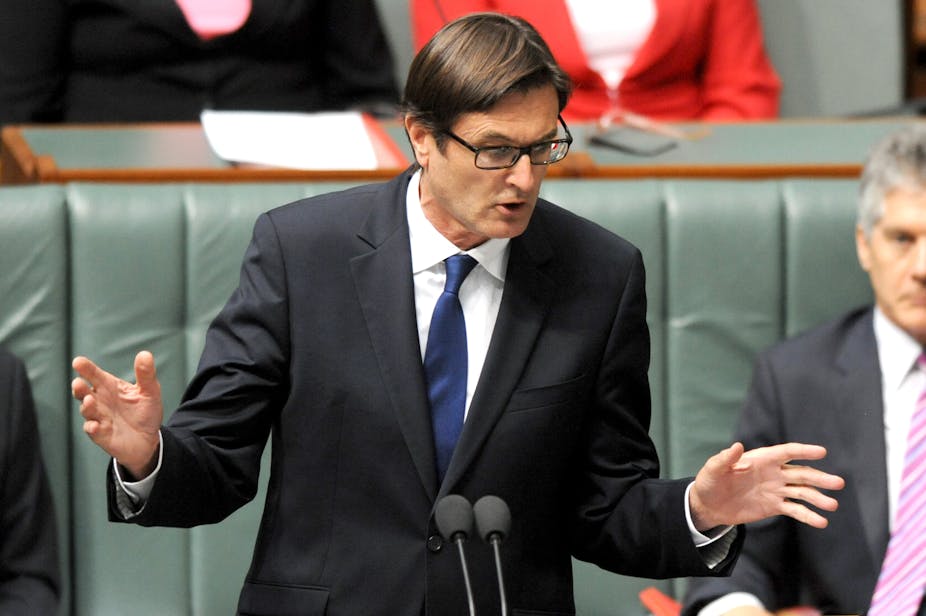So much for Julia Gillard’s hope that the carbon tax debate would fade once the scheme was bedded down in the middle of last year. The issue has erupted again, hitting the government where it hurts at the worst possible time.
This week’s decision by the European parliament not to prop up Europe’s carbon price, which led to it falling 40% to a little over $3 a tonne, is a serious blow on two fronts.
It puts a multi-billion hole at the back end (years 2015-16 and 2016-17) of a May 14 budget that is already under major stress. The anticipated revenue would be significantly less, but the spending would still be high.
And it plays into Tony Abbott’s hands by highlighting that the Australian scheme is at present out of kilter internationally, which strengthens the voices in business complaining about competitive disadvantage.
The Australian carbon price, now $23 a tonne, is set to rise to $24.15 on July 1. It is not until 2015 that Australia would move to a floating price, when it would also be linked to the EU trading scheme.
The budget numbers are now being redone in light of the EU action. Beyond acknowledging that, Climate Minister Greg Combet has played down the European decision.
“This was just one proposal of a number that they are considering to support their emissions trading scheme, so it will now be considered further by the [EU] parliament’s environment committee in Europe”, Combet said on Wednesday, seeming to suggest it might be changed at some point.
The decision has set off a chorus from business with the Australian Industry Group calling for an immediate move to a floating price.
That’s the last thing the government would want to do from a budget point of view. The fiscal impact doesn’t come until 2015-16. If the market was brought forward so would the budget pain.
Ross Garnaut, who prepared the initial work on the carbon scheme for the Government, seeks to put this week’s events into perspective.
“There is a lot of water to go under the bridge before the European emissions price is determined for 2015 and later years. A tightening of targets or restoration of economic growth would change the price outlook.
"In the meantime, the low European price has no effect on the Australian budget or carbon scheme until 2015. Keeping the current arrangements in place will see the Australian price rise with increased international effort after 2015.
"There would be trivial competitiveness gains once free permits to emitters are taken into account, and large budget losses, from moving earlier to link with Europe.”
On the long term view, 2015 is in the distance, but it’s just around the corner for harassed Labor ministers and their officials.
Speculation puts the hole in the budget at perhaps a total of $10 billion for the two years, starting from mid 2015.
But what will appear in the budget will depend on the official estimate of the price in those years and the EU situation injects more uncertainty.
The climate change optimists hope for a recovery; those pessimistic about the European economy will predict the opposite.
Whatever estimate Treasury puts in its figures will be open to debate in the budget where the Coalition will be hotly contesting any numbers that it can.
If the government was hoping to show some pathway back to surplus in the budget numbers this has been made harder.
In trying to juggle its big spending programs, the government is loading a lot into the latter years of the forward estimates – a new assault on revenue then makes this more dicey.
If the floating carbon price in 2015 was anywhere near the current EU level, there would be significant unintended results for the compensation side of the package that the government put in place last year.
Low and middle income earners and welfare recipients would get a windfall, because the compensation has been set on the assumption of a much higher price.
It is perhaps not surprising that the EU, faced with Europe’s immense problems, has opted for short term economics over longer term environmental issues.
In Australia, despite a much more benign economic situation, even mildly harder times have worked against support for tackling climate change.
What was such a strong issue for Kevin Rudd in 2007 will help Tony Abbott in 2013, regardless of the criticisms of his “direct action” alternative.
Last year’s Lowy poll found that for the first time Australians favouring an intermediate approach to the problem of global warming outnumbered those supporting the most aggressive form of action.
One third (36%) backed taking steps now “even if this involves significant costs” – compared with two thirds (68%) in 2006.
Last year 45 per cent backed the option which said that “the problem of global warming should be addressed, but its effects will be gradual, so we can deal with the problem gradually by taking steps that are low in cost”.
The EU decision may help Abbott in another way, if he is elected. Opposition climate action spokesman Greg Hunt said yesterday a Coalition government would expect and urge the ALP “to accept the clear mandate of a new government” and not block the legislation to repeal the scheme.
A very low European price could make it more difficult for a Labor opposition to stand against repeal of a scheme that looked out of sync.
On the other hand, the complex task of unwinding the carbon model could turn into a nightmare for a first term Liberal government.

